The battery gauge drops while driving is not that complicated issue in your car. By testing some of your car’s components, you can find out why your car battery gauge fluctuates.
The vehicle battery is an essential component. The engine gets power from the battery to run the vehicle.
So, it’s really normal that if your car battery has an issue, the battery gauge will fluctuate while driving.
In this post, I will tell you why your battery gauge drops while driving. And you will get some common questions regarding car battery gauge and battery voltage drop.
What Is Battery Gauge
A battery gauge is also known as a battery indicator. A battery gauge or battery indicator is a device that gives you information about your car battery.
In your car, you have lots of gauges on the dashboard. One of them is the battery gauge.
The battery gauge always tells you the current state of your car battery. If anything happens to your car battery, that you can see on your car battery gauge.
That’s why reading and understanding the battery gauge in your car is essential.
Why Battery Gauge Drops While Driving
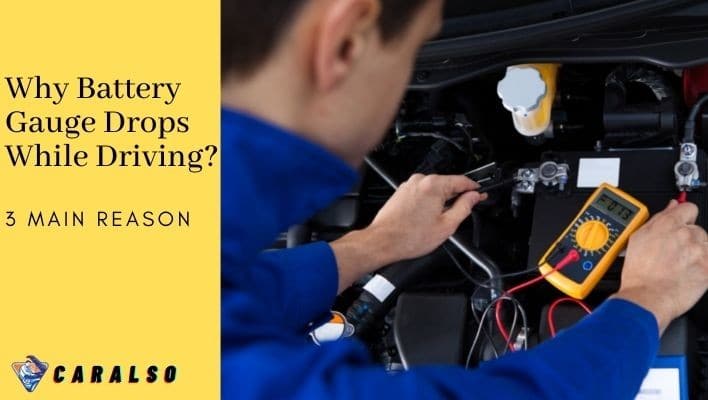
A bad alternator, battery’s less performance, and loose connection are the main reasons why your car battery voltage drops while driving. That’s why you have to check them first to find out what is the reason why your battery gauge goes up and down.
Here are the 5 most common reasons why is your battery gauge fluctuating:
- A Bad Alternator
- Old Battery
- Car was Abandoned
- Loose Connections
- Battery Corrosion
1. A Bad Alternator
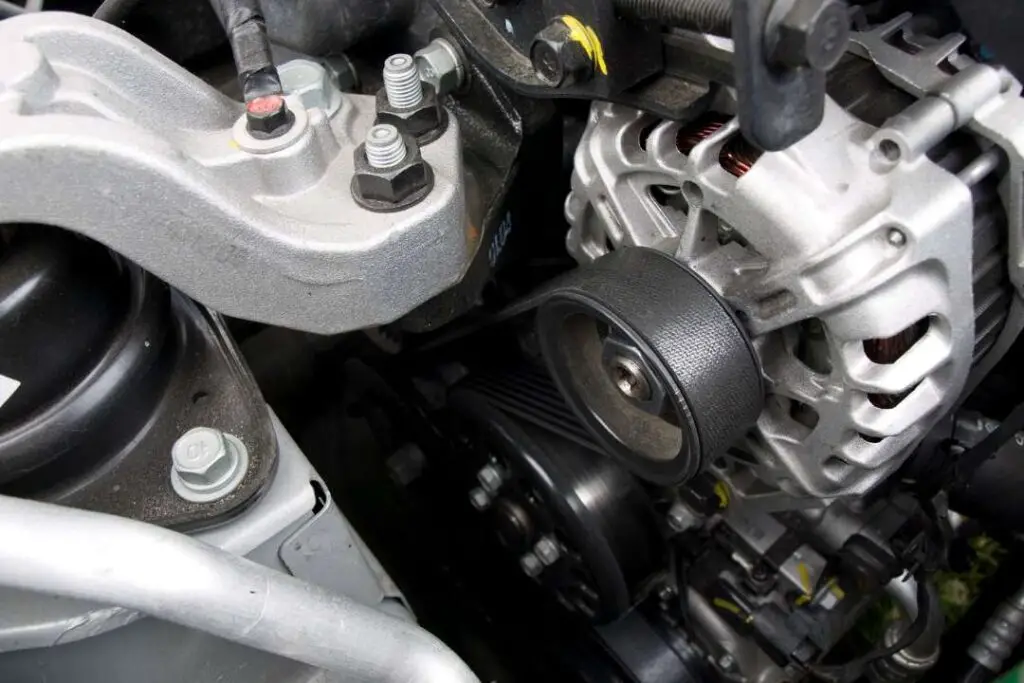
The vehicle alternator is an electric generator. A car alternator’s job is to charge the car battery and provide power to the electronic system in your car.
Through an alternator, the car battery gets charged. Vehicle alternators take the mechanical power from the engine and turn it into electrical energy to recharge the battery.
If you have a bad alternator or overcharged alternator in your car, many issues you might face. An alternator can be the main reason why your car battery gauge fluctuates while driving.
Bad alternators can’t properly distribute the electrical energy in your car’s electronic system and into your battery.
So, if the alternator can’t provide enough power or charge, and that’s why the battery gauge goes up and down.
To tell what causes the battery gauge to drop while driving, you have to test and check your car alternator to see if it’s or not.
The alternator needs a belt (also called a serpentine belt). When you check the alternator in your car, the first thing you need to check is the alternator belt (Serpentine belt).
If you see your car’s alternator belt looks too old, with any visible damage, and too loose to spin, then you need to charge the alternator belt. The total replacement cost of an alternator belt is typically between $120 to $180.
After checking the alternator belt now, you should test the alternator. The easiest way to test an alternator is using a voltmeter.
Below you will see how to test an alternator properly by using a voltmeter. You need to follow the instructions below step by step:
- To test an alternator, first, you need a voltmeter.
- Check the car battery voltage with the engine off. The battery voltage should be between 12.5 to 12.8 volts. If battery voltage shows less than 12.4 volts, this means your car battery needs a charge. Charge the battery if the voltage is low before conducting the alternator test in your car.
- Start the engine and recheck the voltmeter. If you see that the voltmeter shows between 13.8 to the 15.3-volt range, this means your car alternator is in good shape.
Related: How To Keep Car Battery From Dying
2. Old Battery
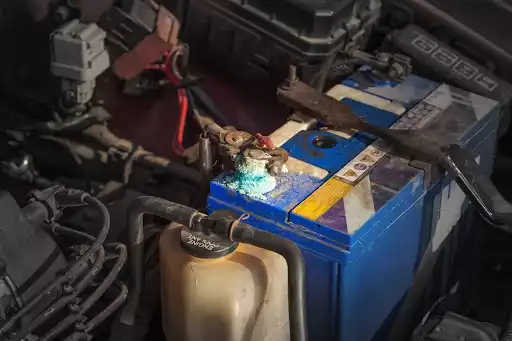
The battery gauge reading on the dashboard is all about the battery. If the battery is not in good shape or old, the battery gauge will show car battery voltage fluctuation.
Checking the car battery can be another solution for why battery gauge drops while driving.
After a long time, the car battery is getting out of order; for any battery, age matters. A better-quality automobile car battery can provide power and work effectively for around 4 to 6 years.
That’s why whenever you buy a car battery, you should buy a car battery from the best places. And always avoid buying the wrong size battery for your car.
Car batteries can get damaged for other reasons. Always avoid any damage to your battery. Regular maintenance of your car battery can avoid any damage and battery acid leaking.
And can maintain the proper battery voltage. Check your car battery properly. The battery should not be too old and not get that hard damaged.
3. Car Was Abandoned

If your vehicle has not been used for a long time or abandoned, then the vehicle can start again with lots of issues, and battery gauge drops while driving or battery voltage fluctuation is one of them.
As you are a car owner, you may know leaving a car with a battery; battery can be dead after a time.
Car electronic systems should get power and supply the power every day. Furthermore, It’s really common and normal; if your car has been abandoned for a long time, it’s having voltage issues and battery cells damaged.
Bring your car to an auto repair shop and tell them to run a battery voltage checking test to see if your vehicle’s battery is working properly.
4. Loose Connections

Loose connections on batteries affect the vehicle flow of electricity. And losing connections in your car is the easiest thing to happen.
Loose connections on the battery can’t maintain the right battery voltage, and when the battery can’t get proper voltage, it makes battery gauge drops while driving. Loose connection in car battery grounding is also a bad practice.
Loose connections also can affect the vehicle alternator. As you knew earlier, a bad alternator can be the reason why your battery gauge goes up and down. It’s always recommended to check the alternator connections also.
In your car user manual, you will see car manufacturers always tell you to check connections are tight and properly connected.
You should also check for any flux or corrosion around the connections. After you check all the connections and see loose connections are the main culprit to battery gauge drops while driving, you have to replace and reconnect all loose wires.
5. Battery Corrosion

We are familiar with corrosion, especially when it’s about batteries. Corrosion damages the battery and prevents the battery from producing the maximum amount of power to the car, which eventually makes the voltage gauge drops while driving.
Open the car battery hood and observe the condition around the battery. An alternator and a battery are connected by wire; that’s why you need to check those wires for corrosion.
Another thing you also make sure the connection between an alternator and battery is alright. A loose wire connection is not applicable to your car battery.
Keeping the battery clean is simple. A bad connection between the alternator and battery and corrosions around the battery can cause battery gauge drops while driving.
Battery voltage issues in a vehicle always make you confused. That’s why you will need to check and test various components in your car.
You should not leave car battery gauge fluctuation issues for automatic solutions; you have to give your car a professional hand.
What Are The Reasons Why Battery Gauge Fluctuates At Idle
To know why your battery gauge fluctuates at idle, you have to check your car’s battery voltage capacity and alternator because a bad alternator and defective battery are the main reasons why your car battery gauge fluctuates at idle.
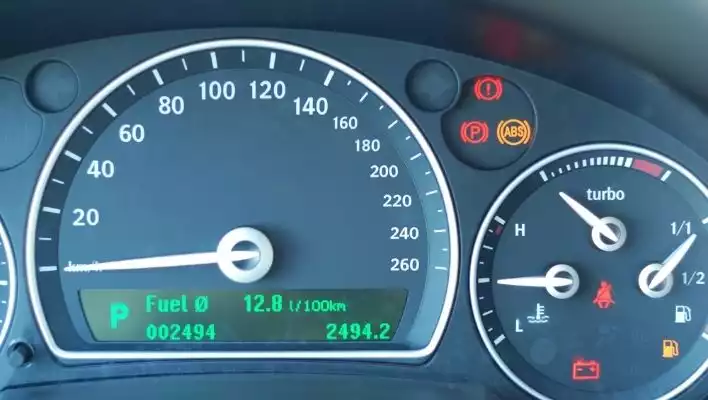
1. Corroded Wires
Corroded wires or loose wires in your vehicle always bring trouble. So, corroded wires can be the reason why your car battery gauge fluctuates at idle.
Whether it is your car at idle or running, the corroded and loose connections around the car’s wires can be a cause why your car battery gauge fluctuates.
Whenever you notice your battery gauge fluctuates at idle, open up the car hood and check wires properly.
You will need to replace loose and corroded wires if you get rid of battery voltage jumping around issues from your car.
2. Alternator is Not Working
The alternator is directly connected to the car battery; that’s why the alternator should always get attention whenever you have battery voltage issues in your car.
Alternators supply the charge to the battery and keep the battery charged. Check your car alternator properly to see the alternator is working.
If your alternator is not working, the battery won’t get the right amount of charge and voltage to produce a car electrical system. And when the battery can’t get the right amount of voltage, the battery gauge drops at idle or while you are driving.
3. Drive Belt
The drive belt is also known as the serpentine belt. The serpentine belt always rotates when your vehicle is running or driving.
The drive belt has an essential role in your vehicle because it powers the alternator, air conditioning compressor, and steering pump.
As you know, the alternator is necessary to produce proper voltage to a car battery, so if the serpentine belt is not working, it won’t be able to supply the power to the alternator.
And when the alternator doesn’t work, the battery gauge will fluctuate at idle.
It is necessary to diagnose why the battery gauge fluctuates at idle, is necessary and it will be very easy if you check the drive belt and alternator properly.
Why Battery Voltage Drops When Accelerating
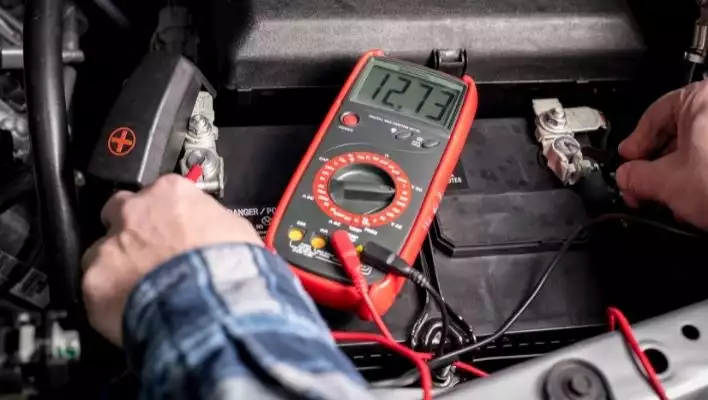
If your car battery voltage drops when accelerating, this means something is drawing more current during acceleration. You need to detect which component of your car draws the current most when you are accelerating.
Here are the most common reasons why battery voltage drops when accelerating:
- The battery: A car battery can draw the most current, and that’s why your car battery can be the main reason why battery voltage drops when accelerating.
- AC compressor: car air conditioning compressor is another decent current-consuming component in your vehicle. So, check the air conditioning compressor whenever you notice battery voltage drops when accelerating.
- Ignition voltage: Car’s ignition voltage needs to be sometimes measured, especially if your car battery voltage drops when accelerating. Get professional help if you don’t have the experience to test ignition voltage.
What To Do If Battery Voltage Drops When Accelerating
When you know why your battery voltage drops during accelerating then you have to know what to do if car battery voltage drops when accelerating.
- Battery voltage measurement
Fully charged car battery voltage should be around 12.6 to 12.8 volts. That’s why if your car battery voltage is less than 12.5 volts, this low voltage can cause battery voltage drops when accelerating. You need to make sure the battery voltage goes up to around 13 V.
- Turn off all the components while accelerating
When you turn on the car air conditioner in your car, the AC in your car consumes voltage from your car battery. Car air conditioners and all of the electrical components you turn on in your car take voltage from the battery. That’s why when you accelerate the car, try to turn off all the components that consume the voltage.
- Check the alternator
Whether your battery voltage drops while driving or the battery gauge fluctuates at idle, you need to check the alternator in your car. When it comes to battery voltage issues in vehicles, an alternator can play a prominent role. That’s why if the battery gauge goes down when accelerating, you need to check the alternator properly.
Why Battery Gauge Drops When AC is On
The battery gauge drops when AC is on because of the alternator in your car, especially if your car has a one-wire alternator.
When you run the car air conditioner, it draws 70+ amps, and one wire alternator does not sense that high draw.
For those who don’t know what a one wire alternator is. One wire alternator means a single wire used to connect the alternator to the battery.
There are no other wires that need to be connected to the electronic system in your car.
An alternator needs 14 to 15 volts to compensate for the extreme voltage that you are experiencing in your car.
When you turn on your car AC, it consumes high voltage for the battery, and the alternator job compensates for that voltage in the battery.
That’s why a one wire alternator is not that powerful to pay for this amount of voltage.
Most of the time, alternator performance causes the battery gauge to go up and down.
Bad alternator performance and loose connection between battery and alternator cause for battery gauge drop when ac is on.
Frequently Asked Questions (FAQs)
What should battery voltage be while driving?
A fully charged car battery voltage should be 12.6 volts or above. But while you are driving your car, the battery voltage should be higher than that.
When you drive your car, the battery voltage should be between 13.7 to 14.7 volts. If the car battery voltage shows a lot less than 13.7 volts while driving, you should check your car alternator.
Where should the needle be on the battery gauge?
The needle should be in the middle or just above the center of the battery gauge.
If your car battery produces the right amount of battery voltage, the needle will be in the middle of the battery gauge.
Test the battery voltage if you see the needle is not in the middle of your battery gauge.
How many volts should a car battery lose overnight?
Losing battery voltage overnight depends on the battery’s health and storage ability.
When the car engine is running, battery voltage should be above 13.6 V, and 12.6 V should be when the car engine is off.
Battery voltage can be 12.1 V in the morning; the rest of the voltage can be lost overnight.
Is it normal for battery gauge to fluctuate?
The battery voltage fluctuation is totally normal. Battery voltage fluctuates because of using different types of accessories.
But battery voltage going too low or too high is not normal at all. To avoid any issue with your battery, you have to check the battery voltage regularly.
What should the battery gauge read in a truck?
A truck or a car both are vehicles. Truck manufacturers also use automobile batteries just like cars.
You should read at least a 12.6 volts battery gauge in a truck with a fully charged battery. And when your truck is running, you should read 13.7 to 14.6 Volts on the battery gauge.
Final Words
Now you know what caused the battery gauge drops while driving. The battery gauge fluctuation happens not only for car batteries, and there can be other reasons.
An automobile battery is the fundamental part of a vehicle. Your whole car’s electrical system is connected to the battery. That’s why there is no chance to avoid any battery issues in your vehicle.
Whenever your car battery gauge goes up and down, and you notice too high and low fluctuation, you have to check the car alternator first.
If you find any issue with your car alternator, you have to fix that issue right away.
Every time an alternator is not the culprit. Battery wire connections, corrosion, and your battery’s state can be the main culprit; that’s why check all of the components connected to the battery.
I hope now you know why your car battery gauge drops while you are driving.
If you have any future questions about the battery gauge (battery indicator), let us know in the comment below. Thank you for visiting my blog. Have a good day.

Hey there,
How is it going?
I’m Meraj Sarker. I am a Car Mechanic and a student of Automobile Restoration here in Florida, USA. I’ve been studying automotive for around 9 years now. So you can rely on my recommendation. For me, studying and getting knowledge about automobile it’s really fun and entertaining. I will help you to get solutions for your car through this website. If you need any help let me know.

I.hAve a 2004 Chevy pickup 1500 4.8 L with 3 speed overdrive and trailer package w ith the button on the shifter ,I lost 3 andoverdrive does the charging system have any thing to do with the charging system
Hello Randy Payton.
How you doing today.
With my experienced it seems your 2004 chevy pickup having transmission problem. It would be very useful if you check your Transmission for any fault.
Thank You Randy.
Have a good day.
When I put my truck in gear sometimes my volts go really low like 10 or under so I turn it off and start it again and it runs fine can you tell me batter air alternator or is it a wire
Hello Joan,
Thank you from Caralso
How you doing today?
When it comes to vehicle’s battery gauge drops while driving, the most common cause is a bad alternator, that you mentioned in here. But to know if the alternator is bad or its wire is not connected, you have to inspect your truck alternator properly. After that you will understand what really happened with your alternator. So, check you truck alternator properly.
If you have more queries feel free to know me here, Joan.
I tested chassis battery on my Class A RV yesterday morning. Weather was mid to upper 30s. Voltage w/ engine off was 12.54v; engine running voltage was 14.52. Voltage after running engine was 12.7 / 12. 6.
I noticed however with engine off and key in accessory position the 12.6 voltage began to quickly drop…I watched for several minutes and voltage did not stabilize…was at 12.2 and reducing when I stopped. What is battery telling me? I have been having in dash radio issues sitting still or driving and am thinking battery has issues. Appreciate your opinion(s)
Hello David Todd,
how you doing today?
Your car’s battery voltage issues can be for starting motor. Your vehicle’s starting motor might draws a lot of current, sometimes as much as 200 or 350 amperes. and eventually, makes your battery low on voltage.
Thank You David Todd,
For more solutions, feel free to ask please.
My 2020 malibu with the turbo 1.5l voltage drops when I accelerate and increases when I let off the gas and sometimes when I apply brakes. HELP!!!!
Hello Chuck,
How you doing today?
When your car battery voltage drops during accelerating that means something is drawing more current during acceleration. That’s why you should check your vehicles components that can drain current such as Parasitic Drain, Defective Alternator, Loose Cables Or Corrosion and more.
Thank you Chuck to joining with caralso
For more information you can comment in here.